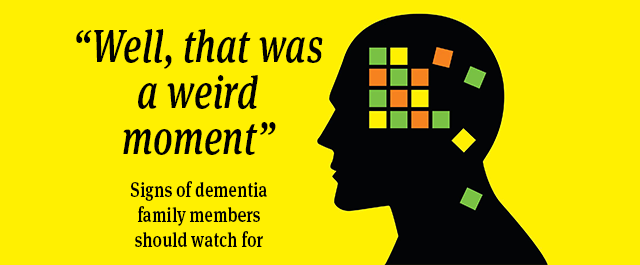PRESS & NEWS
10 ‘Weird’ Signs to Watch for Dementia

The Washington Post recently published an article titled ” ‘Well, that was a weird moment’ and other signs of dementia family members should watch for” which outlined behaviors that may signal frontotemporal dementia (FTD). The article starts with the story of a father who began exhibiting odd behaviors. At work he stopped following through with clients, quit returning…
The Washington Post recently published an article titled “ ‘Well, that was a weird moment’ and other signs of dementia family members should watch for” which outlined behaviors that may signal frontotemporal dementia (FTD).
The article starts with the story of a father who began exhibiting odd behaviors. At work he stopped following through with clients, quit returning phone calls promptly, and began taking more breaks. At home he started drinking, watching more TV, and was quick to become angry. Then came other odd incidences. A body shop wouldn’t fix his car because he couldn’t recall insurance information. A drive to his parents’ house that normally took two hours took five. And then came a phone call from his boss to the family — he was crying and couldn’t remember how to do his job.
The boss took him to a clinic where he was diagnosed with early onset Alzheimer’s disease. But three years later the diagnosis was changed to FTD.
FTD is often misdiagnosed as a psychiatric disorder or Alzheimer’s. It affects the area of the brain generally associated with personality, behavior, and language and is often diagnosed in people between the ages of 40 and 45. It is the most common type of dementia affecting people under the age of 60.
In the WP post, Rachael Wonderlin, a dementia specialist and owner of Dementia by Day, encourages families to get involved early. “If you think something is wrong, talk about it,” she said.
Wonderlin also said to pay attention to what she calls “well, that was a weird moment.” For instance, she was assessing a woman and did not see any deficits — until the woman asked if she could make a phone call and picked up the television remote.
While there are many different signs indicating someone is affected by dementia, here are 10 things to look for in their behavior:
- Notes with reminders about simple tasks
- When neighbors or friends share concerns
- Bills not paid or overpaid
- Physical appearance — someone who was always put together suddenly wears wrinkled or dirty clothing
- Weight changes
- Driving issues: fender benders, parking in the wrong spot
- Picking up an object and using it inappropriately
- Saying things that are inappropriate — “no filter”
- Changes in speech, personality
- Any behavior that is out of the ordinary
The article advises that family members should seek advice from medical professionals even if their concerns are not extreme.
Together we can find a cure for ftd
The FTD Disorders Registry is a powerful tool in the movement to create therapies and find a cure. Together we can help change the course of the disease and put an end to FTD.
Your privacy is important! We promise to protect it. We will not share your contact information.



